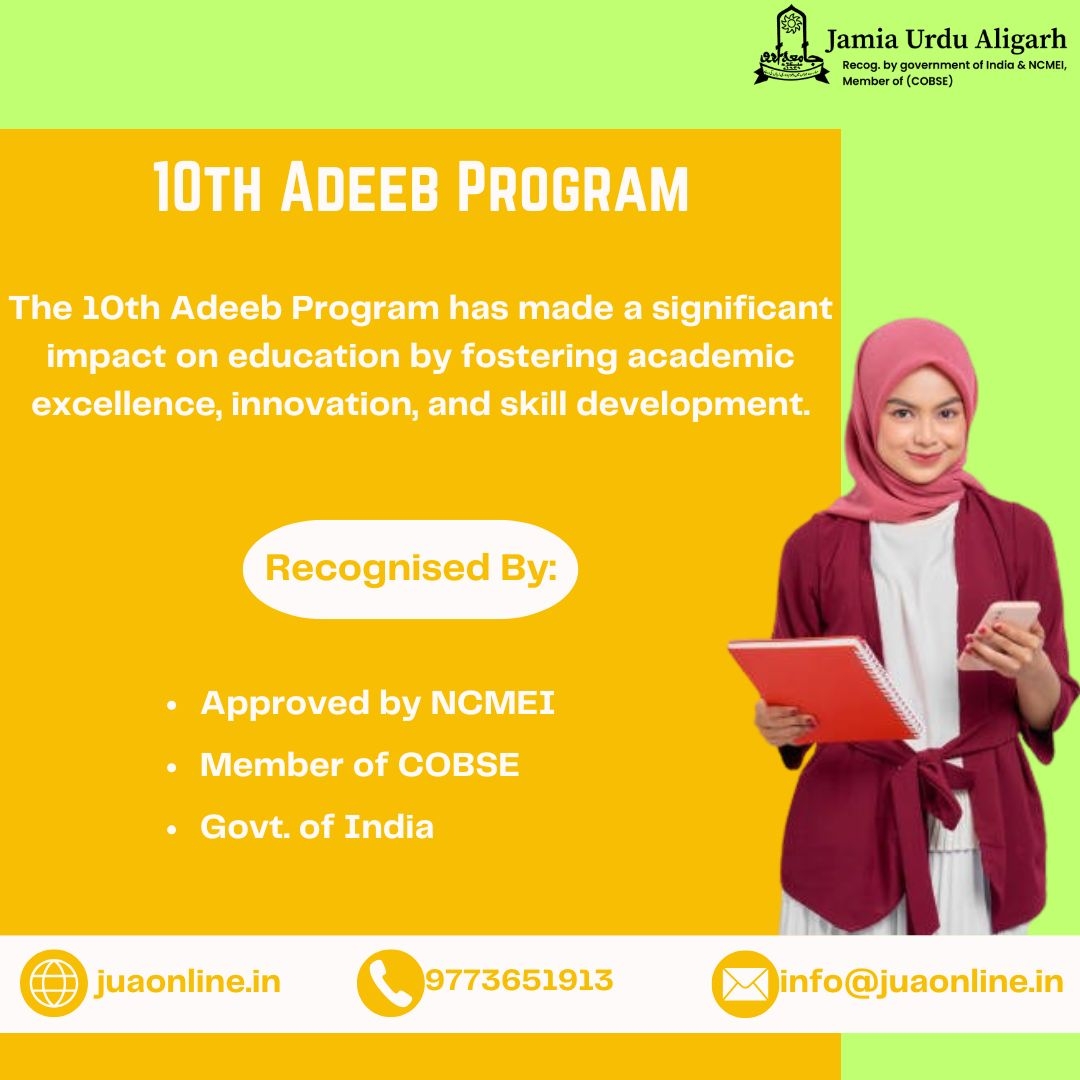10th Adeeb Program and Jamia Urdu Aligarh: Fake Boards in Education

Introduction
Education plays a crucial role in shaping an individual's future, and a recognized academic certification is a stepping stone toward success. However, the rise of fake boards and unrecognized institutions has created confusion and exploitation, leading to serious consequences for students and job seekers. One such controversy revolves around the 10th Adeeb Program and Jamia Urdu Aligarh, both of which have faced scrutiny regarding their legitimacy and recognition.This article aims to provide clarity on these educational institutions, their status, and how students can safeguard themselves from fraudulent boards.
What is the 10th Adeeb Program?
The 10th Adeeb Program is often associated with Urdu language education and is claimed to be equivalent to the secondary school (10th grade) qualification. Many students, especially those from Urdu-speaking backgrounds, enroll in this program hoping to gain an officially recognized certificate.However, the credibility of this program has been questioned in recent years. Various educational boards and government authorities have raised concerns regarding its authenticity and recognition. Despite being advertised as a valid qualification, many students find themselves struggling to get admissions into higher institutions or secure jobs due to the program's lack of recognition.
Understanding Jamia Urdu Aligarh
Jamia Urdu Aligarh is another name that frequently appears in discussions about unrecognized educational boards. Originally established to promote Urdu education, it has a long history, but its current academic credibility remains questionable. While some of its courses claim equivalence to recognized board exams, many educational institutions and employers do not accept its certifications.Authorities have raised concerns that Jamia Urdu Aligarh does not hold recognition from key national education councils such as CBSE, ICSE, or state boards, making its certifications largely invalid for official use. Despite this, many unsuspecting students enroll in its programs, only to realize later that their qualifications are not accepted for further studies or job applications.
Signs of a Fake or Unrecognized Board
The Jamia Urdu Aligarh Fake Board educational and programs, it is essential to know the signs of a fraudulent institution. Here are some key red flags:
-
Lack of Government Recognition – A legitimate board is recognized by education authorities such as the Ministry of Education, UGC, or respective state education boards.
-
Unrealistic Claims – Fake boards often promise quick certifications, guaranteed success, or equivalency to reputed educational boards without official approval.
-
No Physical Presence – Many fraudulent boards operate entirely online, without a physical campus, administrative office, or a proper faculty structure.
-
Inconsistencies in Certificates – Authentic certificates have unique registration numbers, proper seals, and official signatures, while fake certificates may have errors, incorrect spellings, or generic formatting.
-
Refusal to Verify Credentials – If an institution refuses to provide a verification mechanism for its issued certificates, it is a major warning sign.
Impact of Fake Boards on Students and Job Seekers
The repercussions of obtaining a degree from an unrecognized board can be severe:
-
Higher Education Denial: Universities and colleges often reject applications from students who hold certificates from fake or unrecognized boards.
-
Employment Issues: Many employers conduct background checks and may refuse job applications if the educational qualification is from an unrecognized institution.
-
Legal Consequences: In some cases, presenting a fake degree can lead to legal consequences, including penalties and disqualification from exams or government jobs.
-
Financial Loss: Many students invest their hard-earned money into these programs, only to find out later that their qualifications are useless.
How to Verify an Educational Institution’s Legitimacy
Before enrolling in any academic program, students must verify the authenticity of the institution. Here’s how:
-
Check Government Recognition: Visit the official websites of UGC (University Grants Commission), AICTE (All India Council for Technical Education), and state education boards to verify the legitimacy of the institution.
-
Contact Regulatory Bodies: Directly reaching out to the education ministry or relevant board can provide clarity on the institution’s recognition status.
-
Review Official Notifications: Many government websites release lists of recognized and fake institutions. Checking these lists can prevent students from falling into a scam.
-
Seek Alumni Feedback: Speaking to former students can provide valuable insights into the credibility and value of the institution’s degree.
-
Avoid Shortcuts: Education is a long-term investment. Avoid institutions that promise quick degrees or certifications without proper examinations.
The Government’s Role in Curbing Fake Boards
Governments and education authorities have been taking strict actions against fraudulent institutions, including legal crackdowns and blacklisting of fake boards. Measures such as:
-
Public Awareness Campaigns: Educating students and parents about fake degrees through awareness programs.
-
Strict Regulations: Implementing strict norms for board accreditation and certification.
-
Legal Action: Penalizing institutions that issue fraudulent certificates and mislead students.
-
Digital Verification: Introducing online verification systems for educational certificates to prevent fraud.
Conclusion
The rise of fake educational boards, including programs like the 10th Adeeb Program and institutions like Jamia Urdu Aligarh, highlights the importance of thorough verification before enrolling in any course. While these institutions may offer Urdu education, their legitimacy and acceptance in mainstream academics and employment remain uncertain.Students must stay vigilant and ensure that their chosen institution is recognized by government authorities to avoid future complications. Education is a valuable asset, and securing a degree from a legitimate and accredited institution is the key to a successful future.By spreading awareness and taking informed decisions, students and job seekers can safeguard themselves from the traps of fake boards and unrecognized educational programs.
- Questions and Answers
- Opinion
- Motivational and Inspiring Story
- Technology
- Live and Let live
- Focus
- Geopolitics
- Military-Arms/Equipment
- Security
- Economy
- Beasts of Nations
- Machine Tools-The “Mother Industry”
- Art
- Causes
- Crafts
- Dance
- Drinks
- Film/Movie
- Fitness
- Food
- Games
- Gardening
- Health
- Home
- Literature
- Music
- Networking
- Other
- Party
- Religion
- Shopping
- Sports
- Theater
- Health and Wellness
- News
- Culture

